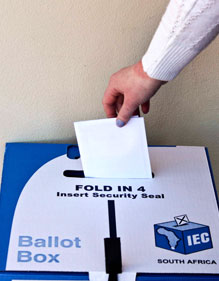
Thank you for clarifying the rules on public funding for elections, but we would like to know why private funds collected by political parties are not transparently disclosed. This matter was litigated and the parties agreed to enact a law promoting the disclosure of private funding, but it has not happened. When politicians feel a greater commitment towards their donors than towards citizens, the poor suffer most because they lack the resources to pressure politicians to keep their electoral promises. Can Parliament be compelled to require parties to be held accountable – publicly – for the funding they receive behind closed doors?
Anxious Citizens
Dear Anxious Citizens
In 2005, the Institute for Democracy in South Africa (Idasa) went to the High Court in Cape Town about this issue. It wanted to establish the principle that all political parties that have seats in the national, provincial and local government legislatures are required to disclose details of their funding.
Idasa argued that it was a requirement of the right of access to information.
The respondents included all the significant parties, including the ANC and the Democratic Alliance.
In an unusual show of solidarity, the parties put aside their differences and resisted an order compelling them to disclose their private funders.
They said they endorsed the values of transparency, openness, accountability and the combating of corruption in public life. But they argued that the regulation of private funding would best be done through legislation after a proper investigation and public debate, rather than as a result of litigation.
The high court held that political parties were not public bodies for the purposes of an access to information application for the disclosure of their records of private fundraising.
Idasa had not demonstrated that it needed access to the information to exercise a right – a requirement when you want information from a private party. The court therefore dismissed the application.
No push for legislation
Despite the views expressed by the parties, there has been no push to pass legislation that would regulate private contributions.
There are many constitutional provisions that show that this kind of legislation would be consistent with the constitutional scheme and strengthen our democracy. For example, the constitution protects the right to fair and regular elections and the right to effective, transparent and accountable government.
Unfortunately, none of these constitutional provisions create an express obligation on Parliament to pass legislation governing private donations. When the constitution requires legislation to be enacted, it says so expressly.
There is therefore no express constitutional obligation that would allow a court to order Parliament to make such legislation. The courts may be reluctant to order Parliament to pass this kind of legislation because of the separation of powers. If there is no constitutional obligation, the courts may be slow to intervene.
Many developed democracies require parties to disclose their sources of private funding. In our view, this would be a valuable safeguard against corruption and the corrosion of democracy.
Ultimately, like many things in South Africa, this issue is a matter of political will. Although our parties do not agree about much, they all seem to agree that it would be a bad idea to force them to tell us who gives them money.
So we will probably be waiting a long time for this legislation.
• This article was first published in Sunday Times: Business Times

